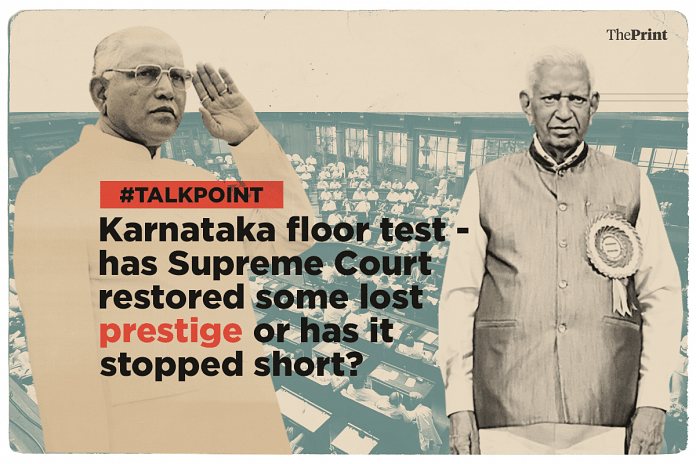A three judge bench comprising of Justice A.K. Sikri, Justice Ashok Bhushan and Justice S.A. Bobde ordered newly sworn-in Yeddyurappa’s government in Karnataka to prove its majority in under 36 hours.
They have overruled Governor Vajubhai Vala’s decision which had provided them 15 days.
ThePrint: Karnataka floor test – has Supreme Court restored some lost prestige or has it stopped short?
Constitution doesn’t say so, but proving majority in 3-4 days can be a good convention
 Arvind Datar
Arvind Datar
Senior advocate
On a constitutional level, what the Supreme Court has done is correct. It is a much better decision considering the fact that it will help deter the poaching of MLAs. The Constitution doesn’t really provide for it, but it can act as a good convention.
Constitutionally, even the governor was right in calling the single largest party to prove majority. But providing them 15 days was far too much and provided a window for political mischief. It increases the possibility of horse-trading and defections.
They have reached a judgment guided by the spirit of the Constitution. MLAs being locked in resorts, in both Tamil Nadu and Karnataka, was not an ideal situation for anyone. The Supreme Court has upheld the spirit of democracy. It is a healthy thing to do and may set a good precedent.
However, the Supreme Court’s decision is guided by the particular circumstances in Karnataka. It has nothing to do with the other issues that have surrounded the Supreme Court, and it is not like they are trying to save face by doing damage control.
SC’s decision a fitting rebuke to Karnataka Governor’s decision to invite Yeddyurappa
 Manuraj Shanmugasundaram
Manuraj Shanmugasundaram
Advocate & spokesperson, DMK
The Supreme Court has risen to the challenge today. As constitutional institutions implode everywhere, the judiciary has redeemed itself by, firstly, holding a pre-dawn sitting to hear the petition filed by the Congress and the Janata Dal (S) and, secondly, setting a deadline for the floor test.
After today’s high-voltage hearing, the 15-day ‘deadline’ gifted by the governor has been curtailed and the entire process fast-tracked to protect the sanctity of the democratic process. It shows the court was alert to the possibility of numbers being manipulated, and attempts to vitiate the voting process. By doing so, the court has also carefully treaded around any potential allegations of judicial overreach.
This must be seen as a strong and fitting rebuke of the governor’s decision to invite Yeddyurappa to form the government. The court has merely gone by its own precedent in the Rameshwar Prasad vs Union of India case, and safeguarded the faith of the common man in democracy. It is now up to the legislative assembly to do the same.
Questions on governor’s discretion remain to be answered
 Satya Prasoon
Satya Prasoon
Lawyer, Centre for Law and Policy Research (CLPR) Bengaluru and associate editor, Supreme Court Observer Project
The Supreme Court order advancing the floor test to 19 May is welcome. It was necessary and easy but is not sufficient intervention. The BJP’s brazenness made it easier for the court to entertain doubts about the legitimacy of the entire process. The SC was supported by its recent precedent of Chandrakant Kavlekar concerning the Goa elections fiasco, where the court had observed that “floor test shall be held… as early as possible”.
Three questions — of the governor’s scope of discretion to invite parties for government formation (i.e. pre-poll alliance, post-poll alliance or single largest party); judicial review of governor’s discretion and the application of the anti-defection law — still remains to be clarified.
The true test of the constitutional court will depend on its ability to clear cobwebs around these substantive questions of law. The court’s reputation depended on its ability to respond quickly to the crisis and by convening an urgent midnight hearing, it rose to the occasion. It has done so on two previous occasions, first on the night of the Babri Demolition on 6 December 1992 and then again on the night before Yakub Memon’s execution in 2015. However, these isolated and extraordinary interventions should not distract us from the severe and everyday crisis of access to justice for common people.
The all-night hearings that lasted for three and a half hours were marked by too much orality and little textual reasoning. The court fell short on its duty of public reasoning in the Chandrakant case (Goa Assembly Case) too, where it disposed of the matter with a seven-paragraph order that failed to clarify how the governor must act in such a situation giving rise to the Karnataka crisis.
A lot will now depend on how the court frames and engages with the question of discretion. This is a question that calls for thorough reflection and one wonders if a court, embattled by its own turf wars and often confused about its own discretionary powers, will have the intellectual and moral resolve to take the bull by its horn. What the court has done so far will definitely assuage its credibility, but its legitimacy and respect will depend upon a more thoughtful engagement with the difficult question of discretion.
Courts should be spared politics of state
 Raghav Pandey
Raghav Pandey
Senior fellow, department of humanities and social sciences, IIT-Bombay
It has been part of traditional jurisprudential wisdom that courts be spared the politics of the state. The job of the courts is strictly legal, involving only the interpretation of laws and adjudication of disputes.
The Congress did a great disservice to the nation by seeking to introduce a politically motivated impeachment motion in Parliament against the CJI, which stretched the politicisation of the judiciary to levels never witnessed in our constitutional history.
This is not to say that there can’t be any criticism of the court. Such criticism has to be only legalistic and can never be political.
It is high time the Congress realises this. It is important to mention that it was Justice Sikri’s court whose jurisdiction was questioned by Kapil Sibal, appearing for the Congress, while challenging the Vice-President’s rejection of the impeachment motion against the CJI.
Justice Sikri is part of the bench whose decision today the Congress is celebrating. Actions of political parties like these, of course, have an impact on the prestige of the court.
Coming to the merits of this decision, it is yet again a textbook example of judicial overreach in the series of transgressions that happened in Goa, Uttarakhand etc.
The Supreme Court is no doubt the guardian of the Constitution but it can’t override the Constitution itself.
The Constitution, under Article 163(2), bestows upon the governor discretionary powers; what lies in the ambit of such powers is also for the governor to decide. Also, the governor’s decision on this count shall be final and the validity of anything done in furtherance of such powers can’t be called into question.
The Supreme Court has yet again overlooked this provision. Irrespective of how noble its intentions are, the basic premise of the principle of separation of powers, on which our Constitution stands, was not respected by the court.
Having said that, I don’t think there is, or was, any loss to the prestige of the court due to such acts or decisions. It is still intact, but the court needs to take separation of powers more seriously.
The Supreme Court has upheld democracy and accountability
 Pawan Khera
Pawan Khera
Spokesperson, Congress
The Supreme Court is an institution that inspires us. We have always had faith in it, and I’m glad our faith has been reinforced. It is immensely gratifying that the apex court has issued an order restraining B.S. Yeddyruppa from making any major executive decisions. It will keep him from nominating an Anglo-Indian MLA in order to influence the vote. Also, the proceedings will be videographed, and security provided to Congress and JD(S) MLAs.
The judgment is trying to rectify the mistakes made by the governor. Not just in Karnataka, but in Goa, Manipur and Meghalaya, governors have turned Raj Bhavans into ‘Raj shakhas’ of RSS MLAs. Today marks the day that changes the downward slide of the institution of the Raj Bhavan. It is all thanks to the Supreme Court. Governors occupy a constitutional office, not a party office. This kind of blatant manipulation of the Constitution will not be tolerated. They can’t aid and abet poaching and horse-trading of MLAs.
The integrity of constitutional institutions must be upheld by stakeholders in any democracy. We never had any doubts that the Supreme Court would do anything but uphold that. We must remember institutions are stronger than individuals. They have inbuilt checks and balances to correct likely mistakes.
The Supreme Court has upheld democracy and accountability by taking such a decision.
Indian judiciary must begin course correction
 Apurva Vishwanath
Apurva Vishwanath
Special correspondent, ThePrint
The Supreme Court’s directions ordering an immediate floor test is a balanced, fair ruling in the given circumstances. As the court itself said, an authoritative ruling on who the governor must invite to form the government in case of a fractured verdict will set the record straight.
One good ruling may or may not restore public faith in the judiciary but highlights why it must begin a course correction.
The last two days have demonstrated why an independent constitutional court is absolutely necessary in a democracy. The failings of every other institution are judged and corrected here.
That course correction is not only for fixing its own issues but must also involve standing up to the executive boldly and exercise its independence.
Remember, in 2016, it was in a similar case where Uttarakhand high court chief justice had delivered a hard-hitting verdict when the acts of the governor and the ruling BJP were called into question. It was a ruling that prevented justice Joseph’s elevation as judge of the apex court.
Reiterating Joseph’s name will inspire confidence in the institution. As will finding a mechanism to deal with issues with CJI Dipak Misra or taking fresh stock of other longstanding matters.
Compiled by Deeksha Bhardwaj, journalist at ThePrint.



